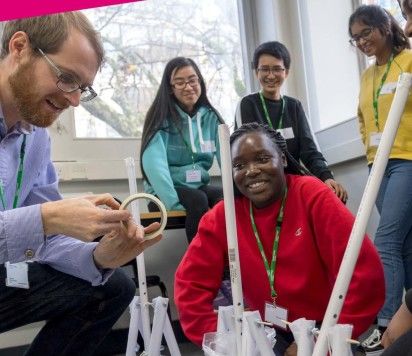
Conducting academic research and using the WROL as a case-study in science education was one of the founding principles ingrained from the WROL’s inception. Two PhD projects have been conducted in the WROL. Dr. Alex Moss completed his research in 2015, looking at and evaluating the impact of the STEM outreach programmes held within the Lab upon London school pupils. Following on from this, Roberts Zivtins began his own project in 2017 and is due to complete in 2021.
Find out more about Roberts' research
Roberts is using the partnership between the WROL and a local secondary school as a case study to investigate the pedagogy of science outreach.
Accordion widget - Key research questions
- The importance of science capital to minoritised pupils
- Impact of our student volunteers
- Focus groups with pupils
Roberts' PhD project focusses on exploring widening participation initiatives, using ‘science capital’ theory (Archer et al., 2015) to help explain patterns of inclusion and exclusion of pupils from minoritised groups in the science sector.
Findings from observation, in particular, highlight how the WROL helps visiting school pupils engage with key elements of practical science, which previous research has shown that minoritised pupils have less access to.
Observation has shown how important impromptu conversations with undergraduate ambassadors can be in helping to prepare visiting pupils for navigating the university admissions process.
School pupils and Imperial undergraduate ambassadors were frequently observed talking about tuition fees and student finance, university interview technique, how to choose a university and how to choose a course – all topics which previous work has shown that minoritised school pupils are less likely to discuss at home or school, when compared to peers.
Visiting pupils, kind enough to give up part of their lunchtime to take part in focus groups, have spoken about their experiences of science outside of the WROL and state how acutely aware they are of their exclusion from the science sector.
These findings further strengthen the view that out-of-school learning experiences, which include pupils in the everyday practices of science and move science beyond the school curriculum, are important for widening participation.
Most recently, the research has been presented at several conferences including the European Association for Research on Learning and Instruction (EARLI) conference in 2019 and a paper has recently been published in the journal of Widening Participation & Lifelong Learning and within Research Intelligence magazine.
